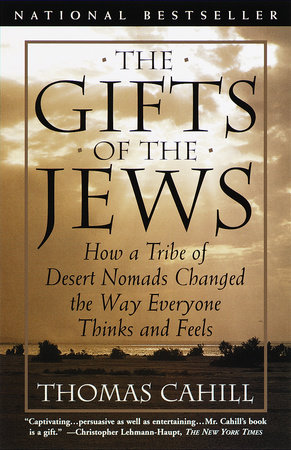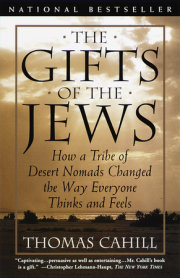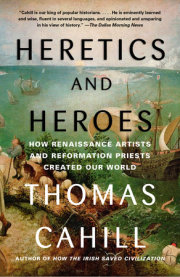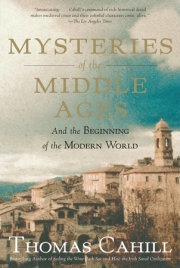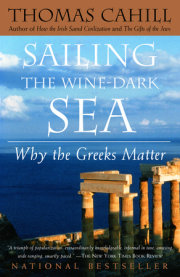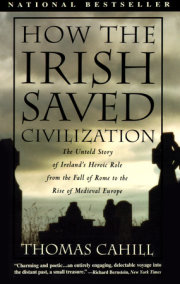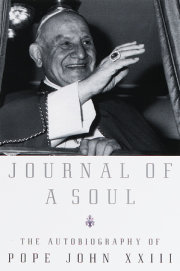The Jews started it all--and by "it" I mean so many of the things we care about, the underlying values that make all of us, Jew and gentile, believer and atheist, tick. Without the Jews, we would see the world through different eyes, hear with different ears, even feel with different feelings. And not only would our sensorium, the screen through which we receive the world, be different: we would think with a different mind, interpret all our experience differently, draw different conclusions from the things that befall us. And we would set a different course for our lives.
By "we" I mean the usual "we" of late-twentieth century writing: the people of the Western world, whose peculiar but vital mentality has come to infect every culture on earth, so that, in a startlingly precise sense, all humanity is now willy-nilly caught up in this "we." For better or worse, the role of the West in humanity's history is singular. Because of this, the role of the Jews, the inventors of Western culture, is also singular: there is simply no one else remotely like them; theirs is a unique vocation. Indeed, as we shall see, the very idea of vocation, of a personal destiny, is a Jewish idea.
Our history is replete with examples of those who have refused to see what the Jews are really about, who--through intellectual blindness, racial chauvinism, xenophobia, or just plain evil--have been unable to give this oddball tribe, this raggle-taggle band, this race of wanderers who are the progenitors of the Western world, their due. Indeed, at the end of this bloodiest of centuries, we can all too easily look back on scenes of unthinkable horror perpetrated by those who would do anything rather than give the Jews their due.
But I must ask my readers to erase from their minds not only the horrors of history--modern, medieval, and ancient--but (so far as one can) the very notion of history itself. More especially, we must erase from our minds all the suppositions on which our world is built--the whole intricate edifice of actions and ideas that are our intellectual and emotional patrimony. We must reimagine ourselves in the form of humanity that lived and moved on this planet before the first word of the Bible was written down, before it was spoken, before it was even dreamed.
What a bizarre phenomenon the first human mutants must have appeared upon the earth. Like their primate progenitors, they were long-limbed and rangy, but, with unimpressive muscles and without significant fur or claws, confined to the protection of trees, save when they would tentatively essay the floor of the savannah--hoping to obtain food without becoming food. With their small mouths and underdeveloped teeth, their unnaturally large heads (like the heads of primate infants), they were forced back on their wits. Their young remained helpless for years, well past the infancy of other mammals, requiring from their parents long years of vigilance and extensive tutelage in many things. Without planning and forethought, without in fact the development of complex strategies, these mutants could not hope to survive at all.
But if we make use of what hints remain in the prehistorical and protohistorical "record," we must come to the unexpected conclusion that their inventions and discoveries, made in aid of their survival and prosperity--tools and fire, then agriculture and beasts of burden, then irrigation and the wheel--did not seem to them innovations. These were gifts from beyond the world, somehow part of the Eternal. All evidence points to there having been, in the earliest religious thought, a vision of the cosmos that was profoundly cyclical. The assumptions that early man made about the world were, in all their essentials, little different from the assumptions that later and more sophisticated societies, like Greece and India, would make in a more elaborate manner. As Henri-Charles Puech says of Greek thought in his seminal
Man and Time: "No event is unique, nothing is enacted but once . . .; every event has been enacted, is enacted, and will be enacted perpetually; the same individuals have appeared, appear, and will appear at every turn of the circle."
The Jews were the first people to break out of this circle, to find a new way of thinking and experiencing, a new way of understanding and feeling the world, so much so that it may be said with some justice that theirs is the only new idea that human beings have ever had. But their worldview has become so much a part of us that at this point it might as well have been written into our cells as a genetic code. We find it so impossible to shed--even for a brief experiment-- that it is now the cosmic vision of all other peoples that appears to us exotic and strange.
The Bible is the record par excellence of the Jewish religious experience, an experience that remains fresh and even shocking when it is read against the myths of other ancient literatures. The word
bible comes from the Greek plural form
biblia, meaning "books." And though the Bible is rightly considered the book of the Western world--its foundation document--it is actually a collection of books, a various library written almost entirely in Hebrew over the course of a thousand years.
We have scant evidence concerning the early development of Hebrew, one of a score of Semitic tongues that arose in the Middle East during a period that began sometime before the start of the second millennium B.C.*--how long before we do not know. Some of these tongues, such as Akkadian, found literary expression fairly early, but there is no reliable record of written Hebrew before the tenth century B.C.--that is, till well after the resettlement of the Israelites in Canaan following their escape from Egypt under the leadership of Moses, the greatest of all proto-Jewish figures. This means that the supposedly historical stories of at least the first books of the Bible were preserved originally not as written texts but as oral tradition. So, from the wanderings of Abraham in Canaan through the liberation from Egypt wrought by Moses to the Israelite resettlement of Canaan under Joshua, what we are reading are oral tales, collected and edited for the first (but not the last) time in the tenth century during and after the kingship of David. But the full collection of texts that make up the Bible (short of the Greek New Testament, which would not be appended till the first century of our era) did not exist in its current form till well after the Babylonian Captivity of the Jews--that is, till sometime after 538 B.C. The last books to be taken into the canon of the Hebrew Bible probably belong to the third and second centuries B.C., these being Esther and Ecclesiastes (third century) and Daniel (second century). Some apocryphal books, such as Judith and the Wisdom of Solomon, are as late as the first century.
To most readers today, the Bible is a confusing hodgepodge; and those who take up the daunting task of reading it from cover to cover seldom maintain their resolve beyond a book or two. Though the Bible is full of literature's two great themes, love and death (as well as its exciting caricatures, sex and violence), it is also full of tedious ritual prescriptions and interminable battles. More than anything, because the Bible is the product of so many hands over so many ages, it is full of confusion for the modern reader who attempts to decode what it might be about.
But to understand ourselves--and the identity we carry so effortlessly that most "moderns" no longer give any thought to the origins of attitudes we have come to take as natural and self-evident--we must return to this great document, the cornerstone of Western civilization. My purpose is not to write an introduction to the Bible, still less to Judaism, but to discover in this unique culture of the Word some essential thread that runs through it, to uncover in outline the sensibility that undergirds the whole structure, and to identify the still-living sources of our Western heritage for contemporary readers, whatever color of the belief-unbelief spectrum they may inhabit.
To appreciate the Bible properly, we cannot begin with it. All definitions must limit or set boundaries, must show what the thing-to-be-defined is not. So we begin before the Bible, before the Jews, before Abraham--in the time when reality seemed to be a great circle, closed and predictable in its revolutions. We return to the world of the Wheel.
*Recently, the designations B.C.E. (before the common era) and C.E. (common era), used originally in Jewish circles to avoid the Christim references contained in the designations B.C. (before Christ) and A.D. (anno dom~n~, in the year of the Lord), have g.uned somewhat wider currency. I use B.C. and A.D. not to cause offense to anyone but because the new designations, still largely unrecognized outside scholarly circles, can unnecessarily disorient the common reader.
Copyright © 1998 by Thomas Cahill. All rights reserved. No part of this excerpt may be reproduced or reprinted without permission in writing from the publisher.

